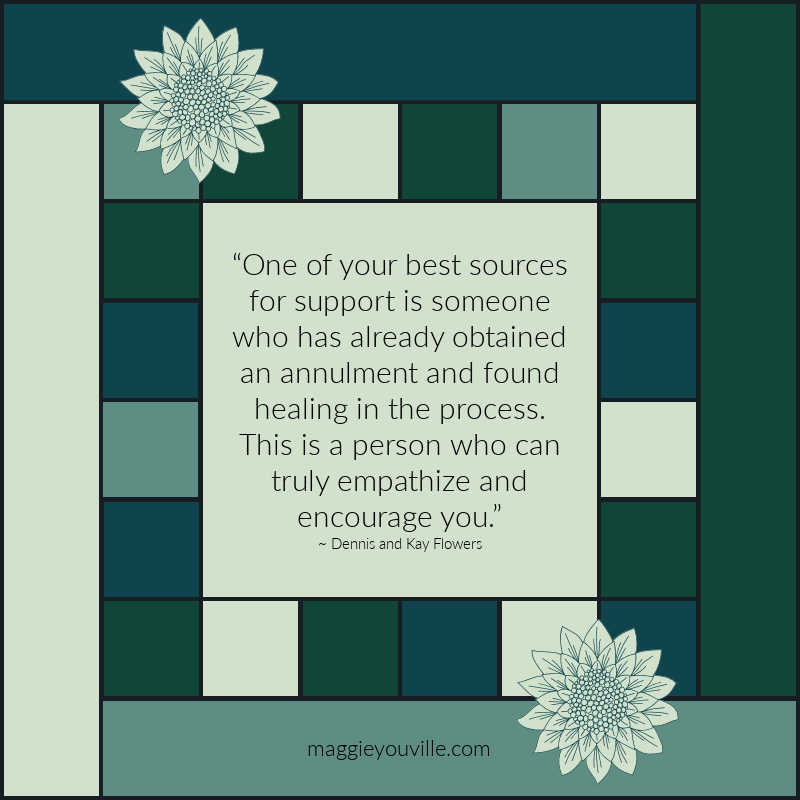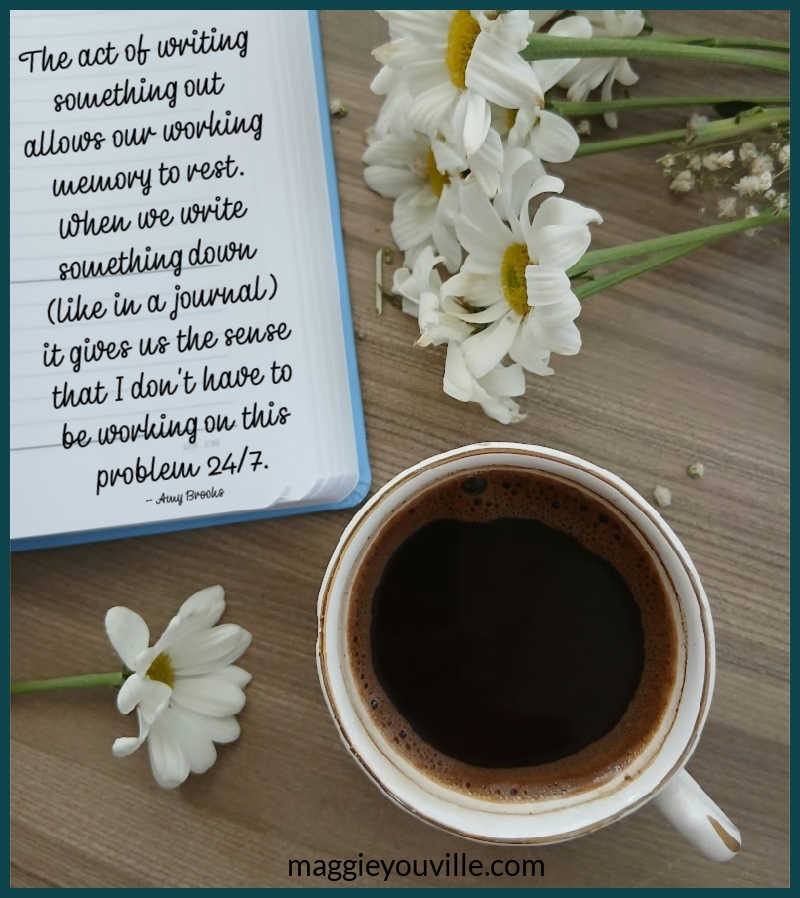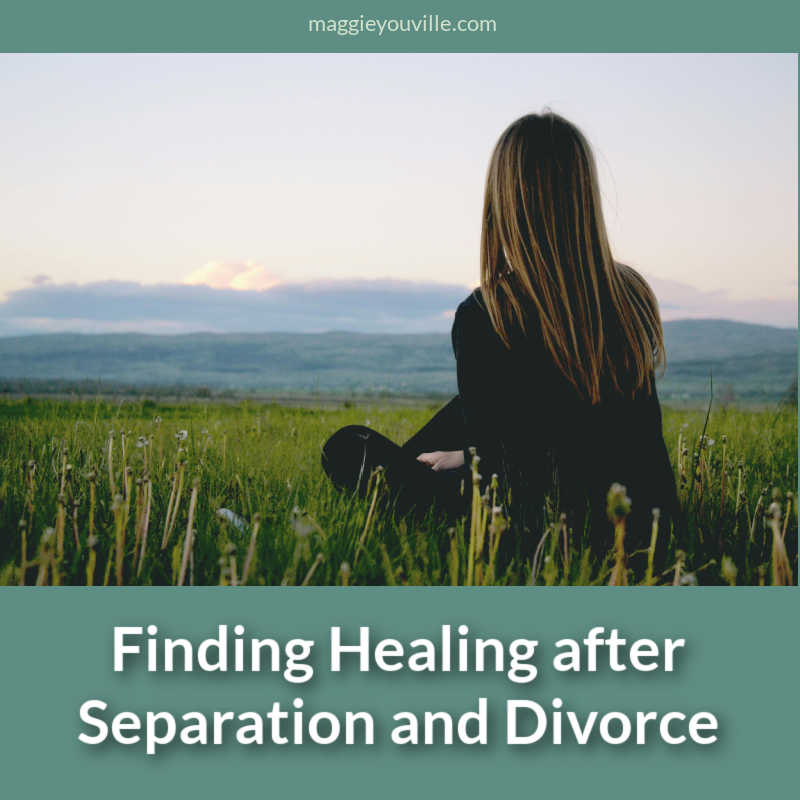The end of your marriage can be devastating, especially if the relationship spanned a decade or two. Your life was built around another person, and when that person is no longer part of your life, you may feel at a loss about what to do. Grief, anger, confusion and other feelings are perfectly normal. Give yourself time to feel these emotions and then choose to walk towards healing.
Think of healing as a journey rather than a destination. Your healing process will not look exactly like another person’s. Your personality, your past, your current struggles, the support available to you, any post-separation abuse you face, and more will all affect your ability to find time for self-care and healing. While there may be certain times when you see evidence of healing in your life, there will also be times when you feel stuck in the past and the pain.
Here are tips from other women who have walked this path for finding healing as you go through separation, divorce, and annulment.
Build a Support Team
One tactic of abusers is to isolate their victims. As you move towards healing, it’s crucial to connect with others who can support you. Your support group could include long-time friends and family (whom you may need to reconnect with) or new people who can come alongside you during this season of life.
Probably one of your best sources for support, however, is from someone who has already obtained an annulment and found healing in the process. This is a person who can truly empathize and encourage you. In your trials, God comforts you so tha you in turn can then truly comfort others. ~ Dennis and Kay Flowers, Catholic Annulment, Spiritual Healing

Find a Hobby
Many women find they give up their former passions when they got married. Maybe there wasn’t time for hobbies due to having children or maybe their abuser didn’t like them spending time by themselves reading, writing, or painting. One way to reclaim your identity post-separation is to re-engage in small, creative tasks that bring you joy. Return to an old hobby you enjoyed before marriage or try something new you’ve always wanted to do.
Get a little hobby. Nothing exciting. Maybe just read a genre you haven’t been able to enjoy in a while (ex was so mad at me when he saw how much I read after we got married and lived together). I learned to play the ukulele. It’s just something silly and I just learned on YouTube. But it helped me a lot to give me something to do with my hands and distract me. ~ Amanda
Find ways to get back into your loves and passions. Music, art, writing, etc. It felt AMAZING to do it again after years of neglect. ~ Mersadis
Practice Self-Care
Self-care is another thing that many women neglect in an abusive relationship. Often, we spend so much energy investing in our spouses and children that we have none left for ourselves. Or we may feel selfish and guilty for taking time for ourselves. Give yourself permission to take care of yourself again.
Mega self-care. And not the trendy kind. Learn to trust yourself and value yourself again. And work through the feelings of guilt and feeling like you shouldn’t spend some time focusing on yourself. ~ Megan
Go No Contact
Go no verbal contact, and only in writing for necessary communication. ~ Megan
Ongoing contact with our abusers can be very triggering and can impede healing. Some contact is necessary during the separation process, especially if you have children together, as decisions need to be made. However, as much as possible, limit this contact to written communication–text messages, emails, or apps.
Limiting verbal contact with your abuser allows you to take time to respond to his communications. I often felt like a deer caught in the headlights when my ex-husband said something to me in person. I’d think of a good response later, but at the time, I often just froze. This is a sign that your nervous system is still on high alert around him.
Learn to Be Alone
Okay, for me…. Every dude came out of the woodwork to try and date me after he left me. I am a bum magnet. So learning to be alone is a skill. Not dating anyone and being good alone. (Not forever if one wants a chance at happiness in relationships…) ~ Lisa Marie
I realized, after my separation, that I had rarely been alone in my life. I grew up with siblings close in age who could hang out with me whenever I wanted company. In university, I had a good group of girlfriends to try new things with, and then I met my husband. As a mom, I usually had kids in tow anywhere I went. Then suddenly I was a single mom, with free evenings once the kids were in bed and free weekends when they were with their dad.
I often ignored my feelings of loneliness by working while the kids were away. Slowly, though, I challenged myself to do things on my own that I wouldn’t have done before. I went to a concert… by myself. I went to a restaurant… by myself. I watched a couple TV shows and began reading again. While I enjoyed spending time with friends, I also enjoyed spending time with myself.
Journal
Writing can be a cathartic way to deal with what you’re facing. The physical act of writing engages many of our senses (forming the words on the page, seeing them, organizing our thoughts to write them down, etc) which can be helpful for many.
Catholic publisher Daniel Francis shares this story about a woman writing her memoirs:
As she wrote about the experiences in her life, she had great difficulty in giving details of the most traumatic and negative experiences, but she always found a great level of catharsis from the experience. As difficult as it was to return to those moments in her memories and to commit them to her book, she found a great sense of release that came from eventually writing them down.
She recalled that when she started therapy her therapist encouraged her to journal, to write out in as much detail as possible those traumatic experiences that have been plaguing her. At the time she could not see the value in revisiting those memories. She believed her therapist was wasting her time and stopped attending sessions. She realised while writing her book how wrong she was for not giving it a try back then.
Journalling for mental health is a great way especially for those with post-traumatic stress disorder or complex trauma to create a space to process their emotions without fear or judgement. You don’t have to publish your writing like my friend plans to do, so you can potentially say the unsayable when journalling out these experiences. It becomes a pillar of growth and release for you.
I would go a step further and say write letters to God. Write out all that you have been unable to say to anyone in letters to God. Trust that He will help you process these pains, deliver relief, and guide you to the next steps.
We tend to be more elaborate and detailed when writing as we can edit our words. Try out writing as therapy and see if it has a positive impact on you.
I found writing helpful after my separation to stop my brain from spinning on all the problems in my life. Too often, my ex would send me an email that would leave me triggered and stressed. I’d mentally and repeatedly answer his email in my head, or worry about my kids, court dates, finances, etc. Amy Brooks from Prayer Wine Chocolate notes, “The act of writing something out allows our working memory to rest. When we write something down (like in a journal) it gives us the sense that I don’t have to be working on this problem 24/7.”

Build a Growth Mindset
Looking back on our past mistakes and failures is painful. It’s not a fun process, but therapy, journalling, and talking with friends are all ways that we can look at our past with a growth mindset. Try to learn from your mistakes, to own your part of the end of your marriage and let go of his part.
By assuming responsibility for your own life in the past, you can also gain control of your future. You don’t want the same forces of conflict to be present in your next marriage [or present relationships]… It’s easier to blame others than to admit your faults, either to yourself or to others. Accepting responsibility can be very disturbing. But the growth process really begins when you can come to terms with your faults, your hurts, your feelings, your actions, and your problems–and you can embrace them as your own. ~ Dennis and Kay Flowers
Reading self-help or spiritual books can also be helpful as you navigate healing, separation, and more. Ask your support group for book recommendations tailored to your situation or check out our resources list.

Leave a Reply